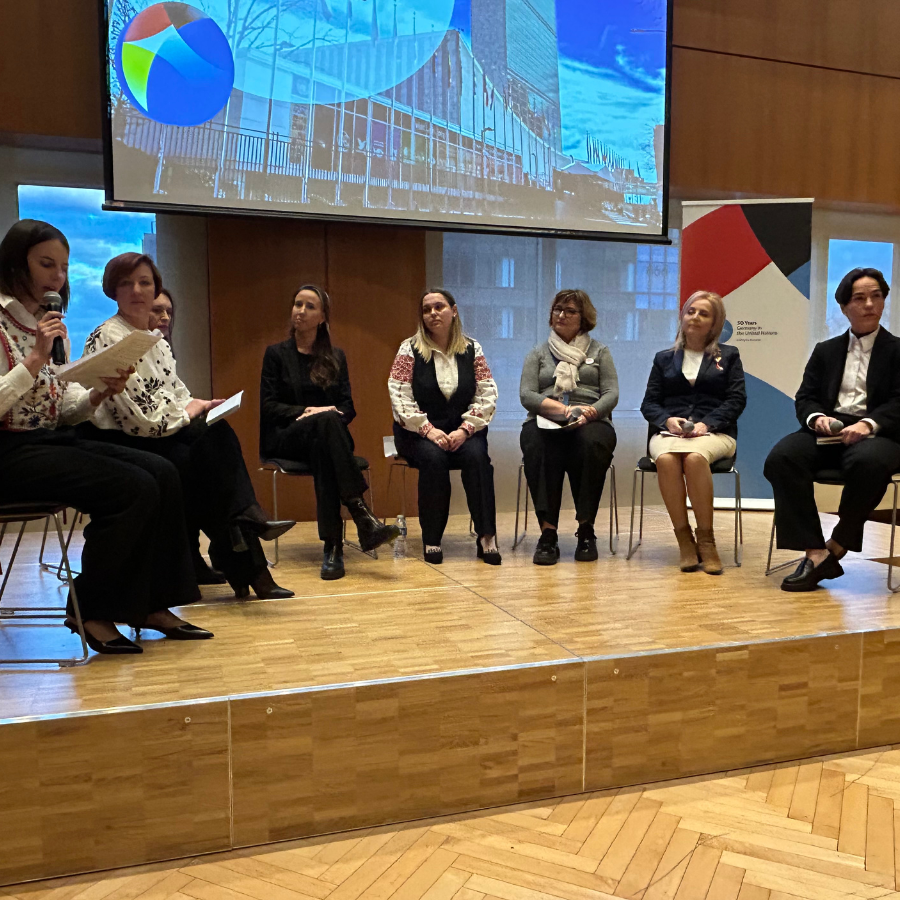 “Let me tell you all something,” Anna said to the room full of United Nations ambassadors, donors, and activists. “Ukrainian women want to go home. They want to rebuild their lives. Until they can, they need support.” Anna Burtea is the co-founder and president of A Child’s Heart Foundation – a refugee- and locally-led organization in Romania providing social assistance to Ukrainian women and children refugees.
“Let me tell you all something,” Anna said to the room full of United Nations ambassadors, donors, and activists. “Ukrainian women want to go home. They want to rebuild their lives. Until they can, they need support.” Anna Burtea is the co-founder and president of A Child’s Heart Foundation – a refugee- and locally-led organization in Romania providing social assistance to Ukrainian women and children refugees.
Anna was part of a Women’s Refugee Commission and HIAS-sponsored delegation of seven women’s rights activists that traveled from Ukraine, Romania, Moldova, and Poland, to the United Nations this month to speak truth to power. Delegation members represented grassroots organizations that work with Ukrainian refugees in Eastern Europe and with internally displaced people inside Ukraine.
The group participated in the United Nations’ annual convening of the Commission on the Status of Women (CSW68), the largest annual conference on gender equality and women’s equality in the world.
They shared their stories about the war’s ongoing disproportionate impact on women and girls and the international community’s failure to effectively support frontline humanitarian organizations—and refugees. Their call to action for the humanitarian community was clear—support women, LGBTQI+ communities, and refugee-led initiatives. Next, they traveled to Washington, DC, to meet with key US government law and policymakers.
“We still have a lot of occupied territories in Ukraine and there will be many more cases of sexual violence and we need to be prepared for this,” said delegation member Iryna Kuratchenko, a Ukrainian psychologist and forensic specialist focused on violence against women and girls, who leads the organization Vzayemodiya in Zaporizhzhia, Ukraine. “It is not just about reparations; it is about the full support for survivors. And these cases need to be taken to the International Criminal Court.”
We were inspired by the story that Jarmila Rybicka, co-founder of Conflict Kitchen in Poland, shared. Conflict Kitchen is a bistro led and staffed by refugees that brings people together while also offering legal employment and stability in the most uncertain time in their lives. Jarmila told us about how she and her team witnessed rampant discrimination and racism in the early days of the war when people first entered Poland seeking safety. When they saw that African nationals, including foreign students and even people who had been seeking asylum in Ukraine, were kicked off trains heading to the Polish border, refused entry into Poland, and even denied access to public restrooms and shelters, Jarmila and her colleagues sprang into action to help ensure that everyone fleeing danger was welcomed with dignity.
And, we were deeply moved as Olena Shevchenko, founder of Insight—an advocacy and humanitarian organization in Ukraine—shared her story of deciding to stay in Ukraine despite the danger because she knew her organization was needed more than ever. Insight offers education and legal support, medical and psychosocial services, and works toward LGBTQI+ inclusion within the humanitarian sector and in the response to the war. Olena, one of the most visible lesbian activists in Ukraine, spoke passionately and directly about the UN and donor governments’ current funding models and requirements for organizations like hers. She made it plain and simple—the entire system is failing, she told us. “It should be a centered approach, a survivor approach,” she said.
We wish we could say this was the first time we heard from frontline women-led organizations about the inadequate prioritization and funding from the UN and other humanitarian donors. We have heard from our partners in Ukraine, Nigeria, and other parts of the globe that funding models often serve as an obstacle rather than a support and fail to center aid around the expertise of those on the front lines.
Only 0.3 percent of bilateral aid goes to women-led and women’s rights organizations in conflict settings. You read that right. Zero point three percent. According to the UN Secretary General’s Annual Report on Women, Peace, and Security, globally, women account for only 23 percent of cabinet ministers, with even smaller numbers in conflict-affected countries. And, in 2022, less than one percent of aid and development spending went to addressing gender-based violence –one of the most pressing concerns for front line organizations given the heightened risk to women and girls fleeing danger.
It’s been nearly a quarter of a century since the United Nations adopted resolution 1325 on women, peace, and security—a landmark for its day—which was meant to ensure women’s full participation in the peace, security, and rebuilding processes in situations of conflict and crisis. Today, too few women hold decision-making roles and funding remains woefully inadequate.
Liv Ullmann
The Women’s Refugee Commission seeks to break barriers for frontline organizations in the halls of power at the UN, in the US Congress, and beyond so they can take their own seats at the decision-making tables. We echo the call for trust-based flexible funding from UN agencies and donor governments and agree that the current funding model fails women refugees and the organizations that serve them.
The women in the delegation are the leaders that people in power need to hear, really listen to, and then take action. Every day, these women witness and respond to the needs of people who are displaced by the war in Ukraine, focusing on meeting the unique needs of people who are often overlooked, underserved, and undervalued.
Humanitarian response and rebuilding—following any crisis—must include leaders like these and other women and LGBTQI+ leaders who have a profound understanding of the problems and have through their daily work made real progress towards solutions. As Olena said to us all—“Everything is possible, if you want it.”







